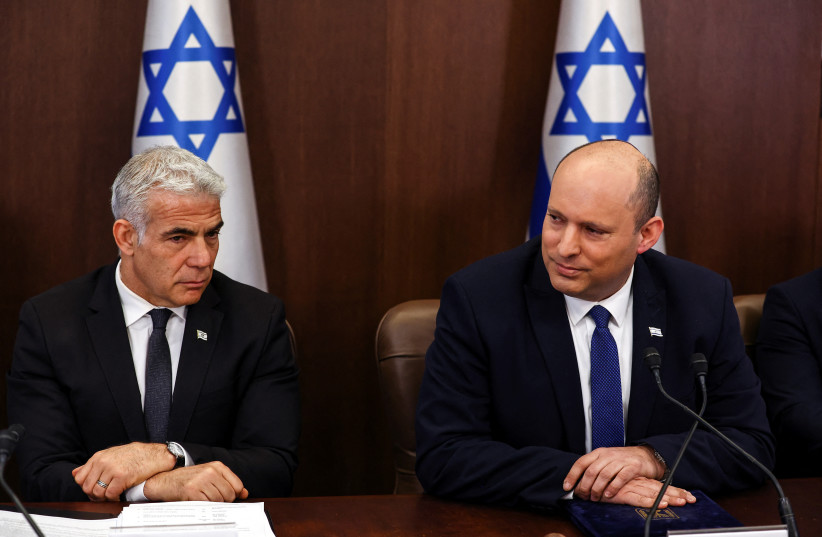Senior officials from countries represented at the historic Negev Summit in March held a follow-up forum in Bahrain yesterday, two weeks before US President Joe Biden’s scheduled visit to the region.
As Oded Joseph, the Foreign Ministry’s deputy director-general who heads the Middle East and Peace Process Divisions, told reporters in a briefing, this is no coincidence. The so-called Negev Summit Steering Committee meeting in Manama serves “as a milestone ahead of the US president’s expected visit to the Middle East,” he said.
Despite the current political turmoil in Israel, all states involved plan to present Biden with a united front promoting regional cooperation and countering a nuclear Iran. It is hoped that two years after the Abraham Accords sealed on August 13, 2020, other countries will now join the alliance formed among Israel, the United Arab Emirates, Bahrain, Morocco and later Sudan.
Jordan, with which Israel signed a peace treaty in 1994, is clearly in line to do so, as is the Palestinian Authority, but the crowning glory is expected to be Saudi Arabia, where Biden is scheduled to travel after his meetings in Jerusalem and Ramallah.
Barring unexpected developments, Foreign Minister Yair Lapid – who is set to become interim prime minister until a new election is held – is getting ready to welcome the US president at Ben-Gurion Airport on July 13.

It was Lapid who convened the unprecedented summit in Sde Boker on March 27 with his counterparts from the US, UAE, Bahrain, Morocco and Egypt, who agreed to work on a range of shared interests.
Senior officials from the foreign ministries of these countries attended the meeting of the Negev Summit Steering Committee in Manama, with Israel represented by Joseph and Foreign Ministry Director-General Alon Ushpiz, and the US by Yael Lempert, principal deputy assistant secretary for the State Department’s Bureau of Near Eastern Affairs.
After Ushpiz met Crown Prince and Prime Minister Salman bin Hamad Al Khalifa in Manama earlier this month, he tweeted: “Fortunate to have the opportunity to discuss matters that will decide not only the future of Israel-Bahrain relations but will also contribute in a major way to regional prosperity and stability.”
The delegates to the Manama meeting are said to have discussed the operation of six working groups, as agreed upon during the original summit: dealing with regional security, food and water security, energy, health, education and tolerance, and tourism. Each country will head a working group and meet at least twice a year.
The Manama meeting
When the meeting was announced in May, a diplomat from one of the participating countries told The Jerusalem Post that participants would try to “put meat on the bone” of the Negev Summit. Joseph said other countries are interested in participating in future multilateral initiatives, including Germany and other European states.
The meeting in Manama comes after EU foreign policy chief Josep Borrell announced that indirect talks to revive the 2015 deal to curb Ian’s nuclear program would resume in Vienna, a prospect that deeply concerns Israel and other countries in the region, including Saudi Arabia.
The Wall Street Journal reported on Sunday that top military officials from the US, Israel, Saudi Arabia, Qatar, Egypt and Jordan had secretly met in Sharm e-Sheikh in March “to explore how they could coordinate against Iran’s growing missile and drone capabilities.”
The paper said this marked the first time that such a range of ranking Israeli and Arab officers had met under US military auspices to discuss how to defend against a common threat, noting that Qatar and Saudi Arabia do not have diplomatic ties with Israel.
US Assistant Secretary of State for Near Eastern Affairs Barbara Leaf hinted last week that more Arab nations are seeking to improve relations with Israel.
“We are working, in the space that is not in the public domain, with a couple of other countries,” Leaf told a congressional subcommittee. “And I think you’ll see some interesting things around the time of the president’s visit.”
White House Press Secretary Karine Jean-Pierre said Biden would attend a summit of the Gulf Cooperation Council plus Egypt, Iraq, and Jordan (known as the GCC+3), and meet counterparts from across the region “to advance US security, economic and diplomatic interests.”
When Shimon Peres outlined his vision for the new Middle East in 1995, he was considered an unrealistic optimist. But two years after the Abraham Accords ushered in a new era in the region, Peres’s vision appears to be materializing.
The meeting in Manama is just the latest example.
